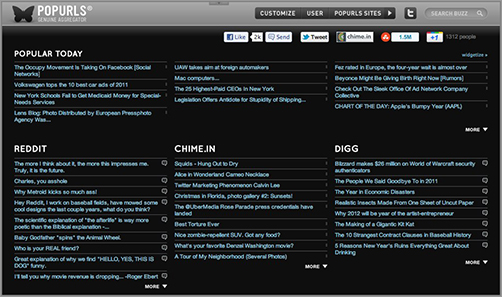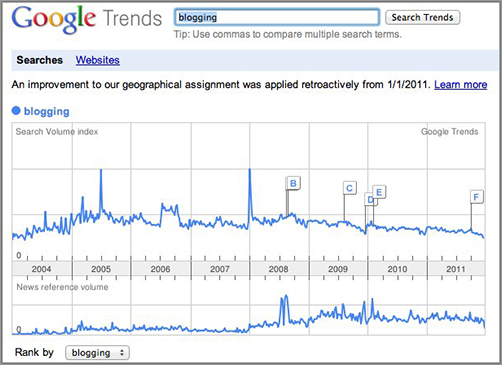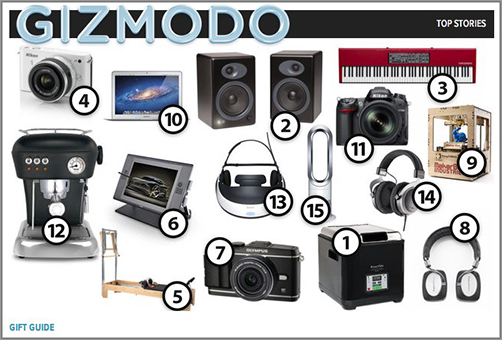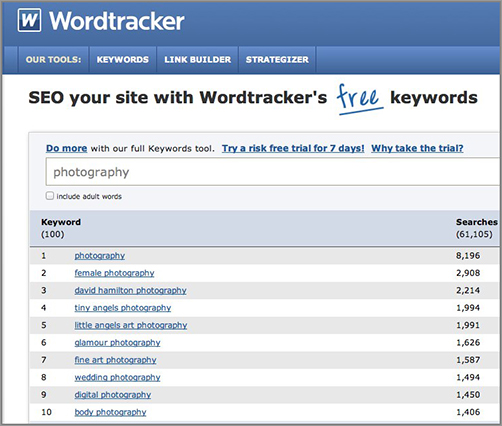Chapter 2
Niche Blogging
One of the most important decisions that bloggers need to make when they want to build a profitable blog is what their blog will be about. This chapter introduces you to the concept of niche blogging and gives you some questions to ask yourself when you are considering what topic to focus your blog upon.
The majority of bloggers starting out do so by creating a personal blog. These blogs are, in many ways, an extension of the life of the blogger and usually cover a wide array of interests, ranging from life experiences to observations on work, hobbies, relationships, and passions.
Personal blogs can be a lot of fun and are a great place to learn about the basics of blogging; however, having a blog focus on such a variety of topics and delving into your personal life doesn’t always make good business sense.
I started out with a personal blog that covered everything from spirituality and church to photography to blogging (and more), and though the blog did become quite popular, after 18 months of running it, I began to notice a number of things that made me consider a new approach:
- Some readers became disillusioned with the blog. My blog had a number of main themes, and different readers resonated differently with each one. A few readers shared all of my diverse interests; however, most came to my blog to read about just one aspect of my life. When I focused on a topic they were not interested in, they either ignored the post or, at times, even pushed back. In the end, a number of regular loyal readers became disillusioned with my eclectic approach to blogging and gave up reading me altogether.
- I began to feel guilty about blogging on certain topics. Knowing that many of my readers were disillusioned by my scattered approach to blogging, I began to feel more and more guilty about posting on certain topics and began to dread the pushback that I knew I would get when posting on things that I was interested in, but that some readers were sick of reading about. As a result, I posted on topics that I was less interested in to appease readers and ignored other topics that I’d rather have covered.
I found myself in a rather frustrating position; I was the author of a blog whose readers were increasingly complaining, and which I enjoyed writing less and less. Something had to change.
After a lot of consideration, I decided to splinter my blog into a number of niche blogs that focused on specific topics. This allowed my readers to get the specific information that they wanted and for me to write as much (or as little) on each of those topics as I wanted, knowing that I was writing to people with specific interests similar to mine.
The result was a more natural blogging experience for me and a more useful blog for readers.
10 Reasons Why Niche Blogs Are Successful
Although it is not impossible to build a successful blog by blogging on a wide array of topics, the majority of profitable blogs that I’ve observed target a defined niche.
Look at the top blogs that you read regularly and you’ll find that the majority of them have a defined niche. Some niches are wider than others, but in nearly all cases they’ve carved out a niche for themselves.
Here are a few of the many reasons why choosing a niche is important for building a successful blog:
- Loyal readers—Niche blogs tend to develop a loyal readership because readers know that when they log in to a blog, they’ll get relevant information on topics that they have an interest in, rather than random posts on topics that they have no desire to read.
- Community—People like to seek out other people who are like them and are interested in the same topics. Many times when you develop a blog focusing on a single topic, you find that a group of like-minded people will gather around it not just to read what you have to say, but also to interact with others who share their passions and interests.
- Specialist authors—Authors of niche blogs have the freedom to focus on a topic without feeling guilty about doing so. This can lead to an increase in the quantity, quality, and depth of articles.
- Brand, credibility, and profile—Blogging consistently on one single topic increases the chances of that blog (and its blogger) being seen as a credible, trusted source of information in that area. Work this correctly and you can become the “go-to” person in your niche and become known as a specialist or expert in your field. The benefits of being seen as the go-to person are huge if you have a product or service of your own to sell. Instead of needing to look for customers, you’ll find that people start to seek you out because of your expertise.
- Contextual advertising—Contextual ad networks like AdSense tend to work best on sites that are tightly focused. They serve more targeted and relevant ads when a whole site is on a defined topic—which, in turn, increases the likelihood of those ads being clicked by readers.
- Ability to sell products—When you understand a niche well and attract an audience around it, you can create and sell products, confident that they have an eager market and will be purchased.
ProBlogger Blog Tip: Spotting Niches
While you are looking around at blogs, try to identify the niche the blogger is working in and the unique qualities of that niche. You will find variations in approach and conventions from topic to topic typical to just that niche:
- Overall subject
- Target audience
- Advertiser market
- Related niches
- Successful content types
- Design style
- Tone of voice
- News versus tutorial
By thinking about blog niches this way, your awareness will grow, which will help you develop an eye for potential niches in which you could happily work.
- Direct advertising sales—Niche blogs are more attractive to private advertisers or sponsors who are looking for content where they can place their ads—content that is relevant and closely aligned to their product or service.
- Search engine optimization—Google and other search engines tend to favor sites with a well-defined topic with pages that relate to one another.
- More posts—I find that I post more if I have five blogs on five topics rather than one blog on five topics. There is only so much you can write on a blog each day without overwhelming your readership.
- Leverage to expand into neighboring niches—One benefit of becoming well-known in a highly focused niche is that you can position yourself to springboard into a neighboring or overarching one.
- Higher conversion—If your blog’s business model is to sell something to your readers, it is to your advantage to have a blog that has a readership with interests that are highly aligned with your own focus. Trying to be all things to all people is a trap that some bloggers fall into. For fear of losing readers, they allow their content to become unfocused and off topic. Though this might help build readership when it comes to selling a product, your conversion rate will be significantly reduced because a lower percentage of readers will be truly interested in your more targeted product. Niche blogging brings in more qualified prospects.
Choosing a niche for your blog enables you, your bloggers, and your readers to become more focused, and enables you to grow a readership and monetize it more effectively.
How to Choose a Profitable Niche Topic for Your Blog
Defining your niche is important if you want to build a successful blog; but how do you choose one?
The following sections are a series of questions that we recommend you ask yourself as you make this important decision. We’ve included some practical exercises with each question to help you tackle them more effectively.
Are You Interested in the Topic?
A friend of mine recently explained it this way:
“Probably the best place to start thinking about what your blog should be about is to consider what you are about.”
In other words, start by identifying your own interests, passions, and energy levels for topics. Although it might be tempting to start blogs based on what other people are interested in or what makes commercial sense, there is little logic in starting a blog on a topic that you have no interest in yourself.
There are two main reasons for this.
- If you want to grow a popular and well-respected blog, it can take considerable time, and you’ll need to take a long-term approach to building it. Successful blogs don’t happen overnight; as a result, it’s well worth asking yourself, “Can I still see myself writing on this topic in a year or two?” If you can’t, you might need to reconsider your topic.
- Your readers will quickly discern whether or not you are passionate about your topic. Blogs that are dry and passionless tend not to grow. Nobody wants to read something that the author doesn’t really believe in.
Exercise
Take some time to brainstorm possible topics based solely on your own passions and interests. What do you know about? What do you do in your spare time? What do you spend your money on? What topic do your conversations with friends always turn to? What ideas or topics keep you awake at night? What books, magazines, TV shows, and websites do you spend time following? Rate each topic in terms of your passion and interest.
Do You Have Experience or Expertise in the Topic?
This is an important question to consider before you start a blog. Not because you can’t start a blog on a topic that you don’t have “expert” status in, but because your own experience in the area will determine how you approach the topic.
Take the “make money blogging” niche as an example. I regularly see bloggers starting blogs that claim to teach people how to make money blogging. They present themselves as experts, but the problem is that many of those behind these blogs have never blogged before and don’t have any experience to draw upon when it comes to teaching others how to do what they claim they can teach.
The result is that these bloggers often run out of things to write about. Their readers quickly see through the claims of the bloggers, and the reputation of the blogger is damaged.
A better approach for someone just starting out in a niche with little experience would be to start up a blog on the topic that is open about what they do and don’t know, and that will document their own learning experience on the topic rather than promote a false claim to know it all and be able to teach others.
These blogs can be quite successful because others at a similar stage often gather around them to share the journey of learning with the blogger. Over time, these blogs can actually transition into “expert blogs” as the bloggers and their readership grow and become more proficient and experienced in their topic.
Exercise
List the topics that you know something about. What have you had training in? What have you had experience in? What topics do people always come to you to find information on? What are you currently learning about or wanting to learn more about? Once you have a list, give each topic a rating in terms of your level of “expertise.”
Is the Topic Popular?
Although the blogger’s interest is important, it’s not enough to build a popular blog.
Another crucial ingredient is that others want to read about the topic you’re writing on.
The law of supply and demand comes into play at this point. You might be interested in your topic and be able to supply great content on it, but unless others are interested in it and are showing demand for it by searching for it, you’ll always have an uphill battle in building a well-read blog.
Keep in mind that you are writing in a medium with a global audience of many millions, and as a result, you don’t need a topic that everyone is searching for, just one that some people are searching for.
Exercise
Head to a newsagent (newsstand) and take a few minutes to do a little analysis of the array of magazines that you see on display there. What are people into at the moment? Which topics are most prolific when it comes to what people are reading about?
Is the Niche Growing or Shrinking?
The popularity of different topics rises and falls over time.
Ideally, you would want to choose a topic when it is on the rise rather than when it is in decline. This is not easy to do, of course, but predict the next big thing that people will be searching for and you could be onto a winner.
Get in the habit of being on the lookout for what people are into. I constantly ask myself, “What will people be searching the web for in 6 to 12 months, and how can I position myself to be the site that they find when they do?”
Keep an eye on what people are into, what the latest trends are, what events are coming up, and what product launches are on the horizon. Do this online, but also keep an eye on TV, magazines, the papers, and even the conversations you have with friends.
Although it isn’t essential to be first to start a blog on a topic, it certainly helps to be early.
Exercise
Go to Google Trends (www.google.com/trends) and type in some of the keywords from niches that you are considering blogging about. Google Trends charts search volumes for different search terms. It tracks only some words (generally popular ones), but it gives a great trend analysis of whether a niche might be growing or shrinking. Compare two or more niches by separating terms with a comma.
What’s the Competition?
One of the traps that some bloggers get sucked into when choosing a topic is to go for the most popular topics with no regard for the competition they might face in those markets.
ProBlogger Blog Tip: Niche Analysis
When selecting a niche, you want to determine the audience size, the level of competitiveness, whether there is any money to be made, and how well you can populate your blog with content over the long term.
Although many bloggers say there is no such thing as competition in blogging and that we are all friends, it could be too much of an uphill struggle to try to break into an overcrowded niche when other just-as-effective niches are available.
How much competition is too much? You might be surprised to learn that in some cases you actually want competition. There are two reasons why you cannot find many competitors for a particular niche:
1. You are a genius and nobody else has thought of writing about your topic.
2. There just isn’t enough interest to sustain a blog long-term.
In most cases it will be the second option, but you can test a niche by creating a new category on your personal blog and seeing what kind of reaction you get.
In fact, many bloggers see successful blogs already operating in a niche and decide that if someone else can do it, they should choose exactly the same topic and attempt to emulate them.
A prime example of this is in the gadget blog space where some of the most successful blogs operate (like Gizmodo and Engadget). The problem with starting a blog on gadgets is that thousands of other blogs are already targeting this niche, with some very entrenched and well-established blogs already taking the lion’s share of the market. Though it is not impossible to start a successful blog on gadgets, picking a niche with fewer and less-established competitors might be a wise move.
The chances are that if you have identified a niche that you think is “hot” at the moment, someone else will have also. It’s supply and demand coming into play again—for any level of demand for information on a topic, only a certain number of sources of information are needed on that topic.
The web is becoming a more and more cluttered place, and sometimes it feels like there are no niches left to blog about. Though this is true in some of the more popular topics, remember that you don’t have to go for the topic that absolutely everyone is searching for. In fact, sometimes it’s some of the less popular topics with little or no competition that are the best earners.
I have one friend, who after years of attempting to do well writing about gadgets, switched to writing about ride-on lawnmowers (a topic he’d been researching for a purchase he was making). He was amazed to find that after just a couple of months of writing on his new topic, it was garnering significantly more traffic (and making quite a bit more) than his gadget websites ever had.
Sometimes it is better to be a big fish in a small pond than a small fish in a big pond.
Exercise
Head to Google and search for blogs on your potential niche. See who has been blogging on your topics. How many other blogs can you find on your potential niche? Make a note of them for the next stage of this process.
What’s the Competition Neglecting?
This question attempts to find “gaps” that are not yet filled in the marketplace. Though your competition might have the advantage of an established audience, you have the advantage of flexibility and can position your blog very quickly to fill a gap that you might observe in the niche. In doing so, you create a sub-niche within the larger topic.
Exercise
When analyzing your potential competitors, you might like to ask some of the following questions:
- What do they do well?
- What are the boundaries of the topics that they focus on?
- What don’t they write about?
- How often do they post?
- How long are their posts?
- At what level of reader are they pitching their blog (beginner, intermediate, advanced)?
- What questions are their readers asking in comments?
- What style or voice do they write in?
- How do they monetize themselves?
- What types of posts seem to get the most attention (comments, Trackbacks, incoming links)?
- What is their design like? What do they do well and what do they do poorly?
- What are other blogs writing about them?
- If they have an open or unlocked stats package, what can you learn from their stats? What pages are popular? Where does their incoming traffic come from?
Doing this type of analysis of your competitors will not only help you work out if there are any gaps that you might fill with your blog, but also how you might do it.
The key objective in thinking this way is to develop a blog that is unique and differentiates itself from other blogs.
Will You Have Enough Content?
One of the key features of successful bloggers is that they are able to continue to come up with fresh content on their topic for long periods of time.
Conversely, one thing that kills many blogs is that their authors run out of things to say.
Answering the question regarding whether there is enough content should be done on two levels:
- Do you have enough content within you as an author? This really comes back to the question we asked earlier about your passion, interests, and energy for the topic (so I’ll leave it at that).
- Do you have access to enough other sources of content and inspiration? Many web-based tools can help you come up with content. Places to check out your topic to see what’s happening in your niche include Google News, Digg, Popurls (Figure 2-1), StumbleUpon, and Reddit. Do a search for words in your proposed niche and you will quickly see how much is being written about them in mainstream media and on other blogs.
Figure 2-1: Popurls links to sources of information (http://popurls.com).

Exercise
Set aside an hour to list as many ideas as possible for posts. If you get three minutes into this exercise and have run out of ideas, it could be an indicator that there’s not enough content to sustain a blog for the long haul.
Is the Niche Able to Be Monetized?
If you are interested in earning an income from blogging, you will need to factor in some investigation of whether the topic you’ve chosen has any obvious potential income streams.
You have many ways to earn money from blogs (we introduce you to many of them later); however, the problem is that not every topic is going to be suitable for every potential income stream.
For example, contextual ad programs like AdSense and Chitika work really well for some topics, but earn hardly anything from others. Similarly, some blogs do fantastically well out of affiliate programs, some are better suited to selling advertising directly to advertisers, and others are better suited to impression-based ads.
Exercise
It can be difficult to know how well different income streams will work on a blog before you actually start it and begin to experiment. However, the more digging around and research you do before starting out, the better equipped you’ll be to make a decision on which niche topic to choose. You might start by:
- Looking at your competition—Check out how other blogs and websites in the niche are monetizing their sites. What ad networks are they using? Are they promoting affiliate programs? If the competition has advertiser pages, how much are they charging for them?
- Searching for affiliate programs—Head to your favorite search engine and type in your potential topic and “affiliate programs.” You’ll be surprised at what will come up when you do this; quite often this will reveal some potential products that you could make some commission on. Try it with a variety of keywords in your search.
- Searching Google—Do a simple search on Google for the main keywords of your potential niche and see how many ads appear above and down the right-hand side of the search results page. This is an indicator that advertisers are using Google’s AdWords advertising program for these keywords. This indicates a likelihood that there will be advertisers if you use the Google AdSense program to monetize your blog.
- Checking out Amazon—Search on Amazon to see if you can find related products that you might be able to link to and make a commission on via its affiliate program.
Blogs come in all shapes and sizes. Take a quick look at some popular blogs and you’ll find that some have wide niches. For example, Gizmodo (Figure 2-2) covers news on all kinds of consumer electronics and gadgets—it covers everything from MP3 players to digital cameras, through to GPS devices.
Some blogs narrow their niche even further and focus on just one class of product, or even in extreme cases, one brand or model.
Both wide and narrow niches can work; however, while some analysis of the most popular blogs shows that they quite often have a wide focus, it is also worth knowing that they usually are in quite crowded niches (lots of competition) and take a lot of work to maintain (many of the top blogs have numerous bloggers churning out content for them).
On the flipside, don’t choose a niche that is too narrow. I once saw a blog start up on a single model of printer. Though this blog had a well-defined niche, its blogger ran out of things to write about after just a week or two.
The take-home lesson is to choose a niche that you can find enough to write about but that won’t overwhelm you.
Should You Try Niche Demographic or Niche Topic?
So far we’ve talked about choosing a niche topic for your blog—something that most successful blogs do. However, there is another type of niche blog that we’re starting to see some bloggers develop—one that doesn’t focus on a niche topic so much as a niche demographic.
These blogs identify an audience that they want to target and then develop content on a variety of topics that would relate strongly to that group of people.
Let me illustrate with a couple of short case studies.
Gala Darling
When I first met Gala Darling at a blogger meetup in Melbourne, she described her blog to me as a fashion blog that documented her own tastes and decisions in fashion as well as covered fashion news.
A few months after first meeting Gala, we caught up over a coffee to talk blogging and she described her blog Gala Darling (galadarling.com, shown in Figure 2-3) in a slightly different way; rather than a “fashion blog,” she spoke about it as a “blog for youthful alternative (unconventional, individual, eccentric) women.”
Figure 2-3: Gala Darling.

The way she talked about her blog changed from being one that revolved around a single topic to one that revolved around a certain type of reader or audience.
Fashion still made up a significant proportion of her posts, but so did other aspects (including travel, relationships, shopping, and music) of the lives of her loyal and growing readership. In a sense, Gala is moving toward providing a one-stop shop for her readers rather than just a smaller destination that focuses on one aspect of their lives.
TCGeeks
Chris and I first met Shane Ketterman at the Blogworld conference. He had launched a successful blog called TCGeeks (www.tcgeeks.com, shown in Figure 2-4), which stands for Tablet Computing Geeks. As the name suggests, it was aimed at people who were interested in iPads, Kindles, and other tablet-type computers.
What made TCGeeks successful was how Shane went above and beyond the competition. Rather than focusing on the topic, Shane instead focused on his audience. One by one his readers discovered how much passion and care he took over the community he was building, and how deeply embedded in the niche he was.
Figure 2-4: TCGeeks.

As you will see in Chapter 6, Shane went on to sell his blog, and part of what gave it the high valuation he received was this focus on his community building.
Sports Networker
Many people now know Lewis Howes as an expert on the social networking site LinkedIn, but in fact he started out in the sports niche. To be specific, he was a professional football player, holding the NCAA All-Division record for the most receiving yards in a single football game.
He founded his website, Sports Networker (www.sportsnetworker.com, shown in Figure 2-5), when an injury permanently put him out of ever playing the game on a professional level, and he had to find a new career direction.
Figure 2-5: Sportsnetworker.

He also went on to found the largest sports business group on LinkedIn with more than 52,000 members and a paid membership site, Sports Executives Association (sportsexec.net). Today his site reaches a network of more than 20,000 sports executives and continues to grow every day.
ProBlogger Blog Tip: The Right Niche for You
You can take two approaches in deciding on your niche: the analytical and the emotional. In most cases our final decision is based on a little of both.
- What type of blog are you drawn to?
- Do you feel excited about working on one topic more than others?
- Are there subjects you just can’t stop talking about?
- Do people know you as an “[insert topic here] geek”?
Many of my more successful blogging friends state that if they won the lottery they would still blog; they love their topics so much. Can you think of a subject you could feel that way about?
Remember that professional blogging is hard, takes time, and, especially, needs lots of valuable and unique content. This is so much easier when blogging a topic you are motivated about.
At this point, it’s time to choose a topic for your blog. It is highly unlikely that you’ll find the perfect topic on all of the fronts discussed earlier.
Although it’d be great to find a topic that you’re passionate about that just happens to have massive demand, no competition, and lots of lucrative income streams, the reality is that most topics that you come up with will have at least one weakness to them.
Don’t let this get you down; there comes a time when you just need to make a decision and start blogging, because the best way to get the answers to many of the questions in this chapter is to start a blog and see what you learn.
The key is being aware of what the weakness is so that you can work to overcome it.
Tools for Helping You to Choose a Niche for Your Blog
Many tools have been developed that are helpful for bloggers in the process of selecting a niche topic for their blog. The following tools are ones that we use in this research phase:
- AdWords Keyword Tool—Sign up as an advertiser with Google AdWords and you get access to a number of useful tools that you can use without actually needing to use AdWords to advertise. One particularly useful tool is the Keyword Tool (https://adwords.google.com/select/KeywordTool), which you need to be logged in to use. This allows you to type in a keyword (or phrase) and will give you an indication of how many people searched for that word in the past month, as well as tell you how many advertisers are competing for that word in AdWords. This gives you an indication of the popularity of the niche and whether there is potential income in it. This tool will also give you other keywords that relate to the ones you enter, which is also useful to know.
- Google Trends—Google has a Trends tool at www.google.com/trends (Figure 2-6) that is useful for looking at search volume on Google for different search terms. Though it won’t give you specific search numbers and doesn’t produce results for every term (it tracks just the most popular ones), it is useful for working out whether a niche is growing or shrinking, and it allows you to compare two different terms to show you how big one is in comparison to another.
- Google Blog Search—Google’s Blog Search will help you to get a picture of who else is blogging on a given topic.
- Wordtracker—Wordtracker (www.wordtracker.com, shown in Figure 2-7) is a popular keyword-research tool with a free trial that helps you to ascertain how many people are searching for different words and how many other sites are competing in those niches.
- SEOBook—Aaron Wall has also outlined a great list of keyword-researching tools at www.seobook.com/archives/001013.shtml. Check it out.
Figure 2-6: Google Trends.

Although the majority of bloggers choose to go with a personal blog when they first start, we hope we have shown that for professional bloggers, a well-selected niche that you are happy writing for can make all the difference to your earning potential.
This chapter looked at the concept of blog niches and gave you an overview of the sorts of considerations that you need to take into account before selecting your blog topic. What you will write about is a much more important factor than many bloggers realize. The subject of your blog, the audience you aim to attract, and, therefore, the market you go into could well be the deciding factor for whether your blog succeeds or fails.

